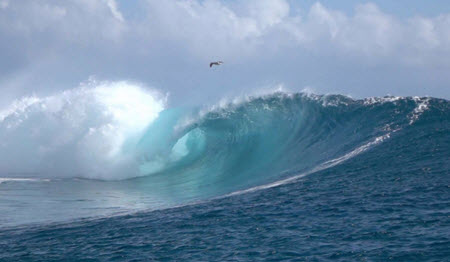By Matthew Long — The Mark News —
The planet’s proverbial canary in the coal mine could very well be its oceans: If they lose dissolved oxygen because of climate change, the impact will be felt all the way up the food chain to people.
 Human-driven climate warming is causing the ocean to lose oxygen on a global scale. This is an underappreciated consequence of climate change, but it is a deeply troubling one.
Human-driven climate warming is causing the ocean to lose oxygen on a global scale. This is an underappreciated consequence of climate change, but it is a deeply troubling one.
The history of life on Earth is punctuated by five major extinction events. In some of these, warming-driven ocean deoxygenation played an important role. For instance, during the Permian-Triassic extinction (about 252 million years ago), volcanism on a massive scale drove up carbon dioxide levels in the atmosphere, warming the planet, causing widespread deoxygenation. Roughly 90 percent of marine species perished.
The change in ocean oxygen now underway is following a similar pattern. Carbon dioxide emissions, primarily from fossil fuel combustion, are warming the planet. As the ocean absorbs heat, it loses oxygen. The question is, how far will we go? Can we cut emissions in time to avert ecological disaster in the ocean?
Oxygen is a sparingly soluble gas; it dissolves in seawater in amounts dependent on temperature. The atmosphere contains most of the planet’s oxygen — the air we breathe is about 21 percent oxygen. The ocean, by contrast, holds less than 1 percent of Earth’s oxygen. This comparatively small inventory, however, is critical for marine life. Animals require oxygen to live and, except for those that breathe air directly, such as marine mammals, animals in the sea acquire oxygen from the supply dissolved in seawater.
Life cannot be sustained where dissolved oxygen levels are too low
Ocean oxygen persists in a delicate balance with climate. Oxygen in surface waters remains high because it is produced there by photosynthesis and is free to exchange with the atmosphere. Oxygen declines with depth because it is continuously consumed by respiration, and must be replenished through circulation of waters from the surface. Climate warming drives ocean oxygen loss by a direct mechanism: seawater holds less oxygen as temperatures rise. However, warming also reduces circulation, thus shutting down the oxygen supply to the ocean depths. It is the compounding influence of direct warming effects amplified by changes in circulation that make oxygen so sensitive to climate.
Marine “dead zones” have received increased media attention in recent years. These can occur where nutrient pollution from agriculture and sewage causes oxygen depletion in coastal regions. While this is an important concern, and likely to be exacerbated by climate change, deoxygenation of the open ocean is a distinct issue, happening on a much larger scale.
Indeed, observations suggest that, globally, oceans have lost substantial oxygen over the last several decades in amounts tightly related to ocean warming. Earth system models indicate that the rate of oxygen loss will dramatically accelerate over the next few decades. Oxygen loss will not abate without mitigation of climate warming.
The impacts of ocean deoxygenation are difficult to predict in detail. The geologic record indicates that consequences for marine ecosystems will be catastrophic if action is not taken to mitigate climate change. It may require more than a century under current carbon dioxide emissions for the magnitude of oxygen loss to equal that of the Permian-Triassic; however, shorter-term impacts on marine ecosystems are also likely to be profound.
Animals are constrained to live where there is sufficient oxygen. Perversely, however, an animal’s demand for oxygen increases with temperature; thus, even current oxygen levels may be insufficient as the ocean warms. As climate change continues, species will be forced to migrate poleward to seek cooler, better oxygenated waters or face extinction.
Ocean food webs involve complex interdependencies between predators and prey. Rising temperatures and deoxygenation will affect species differently, pulling food webs apart and threatening their ability to sustain the marine ecosystem. Species important to fisheries may be directly impacted by oxygen declines—or subject to disruption as food webs collapse. These changes will impact human livelihoods, particularly for communities reliant on fisheries and other marine resources.
Our capacity to contend with deoxygenation will depend on proactive management. We must invest in social, political and scientific resources to adapt. The technology exists, for instance, to provide widespread real-time measurements of oxygen over large regions of the ocean. Synthesizing these observations into improved numerical models can provide a predictive capacity that could be important to managing impacts of deoxygenation.
The ocean will continue to lose oxygen unless we limit carbon dioxide emissions and mitigate climate change. Moreover, ocean oxygen loss is not reversible on timescales of human generations; the ocean will require centuries to recover from changes caused by current carbon dioxide emissions. It is not too late to avert the most catastrophic outcomes, but the earlier we act to limit carbon dioxide emissions and reduce warming, the greater benefit these actions will have.
The ocean occupies more than two-thirds of Earth’s surface. Through deoxygenation, humans are leaving an indelible imprint on this vast ecosystem. We are changing the most basic of properties: the concentration of oxygen, which is fundamental to life. As land-dwelling creatures, this change is difficult to comprehend. Unlike a clear-cut forest, this devastation is seemingly invisible. Nevertheless, observations, models and the planet’s history paint a consistent picture of potential devastation. The need for action is urgent.
 Matthew Long is a Scientist at the National Center for Atmospheric Research in Boulder, Colorado. He received his PhD in oceanography from Stanford University. Before beginning a career in Earth system science, he worked as a civil engineer and spent two-years as a Peace Corps Volunteer teaching secondary school in Tanzania.
Matthew Long is a Scientist at the National Center for Atmospheric Research in Boulder, Colorado. He received his PhD in oceanography from Stanford University. Before beginning a career in Earth system science, he worked as a civil engineer and spent two-years as a Peace Corps Volunteer teaching secondary school in Tanzania.






A DO OR DIE PROPOSITION
No doubt that the destabilization of environment and life forms, resulting from climate change, as in anthropogenic climate disruption or not, is the primary cause of the evolution of the species proclaimed by Darwin, and proven by 20th century science. But the key threat built into rapid climate change, particularly of global warming, is that different species will evolve to adapt at different rates, and thus, many will rapidly perish, unable to cope and survived in a new state, as new species in fact, and others exponentially thrive. mankind may very well perish as a direct result of this phenomenon, or as a consequent result of nuclear war induced by it in the struggle within and between nations for survival. This must be prevented to the extent possible though global cooperation for the full application of science and government, much as intended in the UN-sponsored Paris Accord of 2015. Its dismantlement would be clearly a hallmark of insanity.
Reflecting on the concerns of ordinary people about the serious environmental pollution we are experiencing today and its threatening effects on life on Earth, and the timid efforts of national governments and multilateral organizations to control and reverse it, I get to thinking that there is no sense in encouraging the creation of mechanisms, including not even in tolerating the use of the existing ones, enabling OECD countries (mainly developed countries) to continue emitting pollutants into the environment, whether they be gases, liquids, or solids, critically above the average global emissions by industry, geographic area, or country.
Leadership at this time of anthropomorphic climate change, and catastrophic global warming, requires behaving, and getting others to behave, in line with Roosevelt’s advice to the American people and the people of the world, in his first inaugural address: “This is preeminently the time to speak the truth, the whole truth, frankly and boldly. Nor need we shrink from honestly facing conditions in our country today. This great Nation will endure as it has endured, will revive and will prosper. So, first of all, let me assert my firm belief that the only thing we have to fear is fear itself—nameless, unreasoning, unjustified terror which paralyzes needed efforts to convert retreat into advance. In every dark hour of our national life a leadership of frankness and vigor has met with that understanding and support of the people themselves which is essential to victory. I am convinced that you will again give that support to leadership in these critical days.”